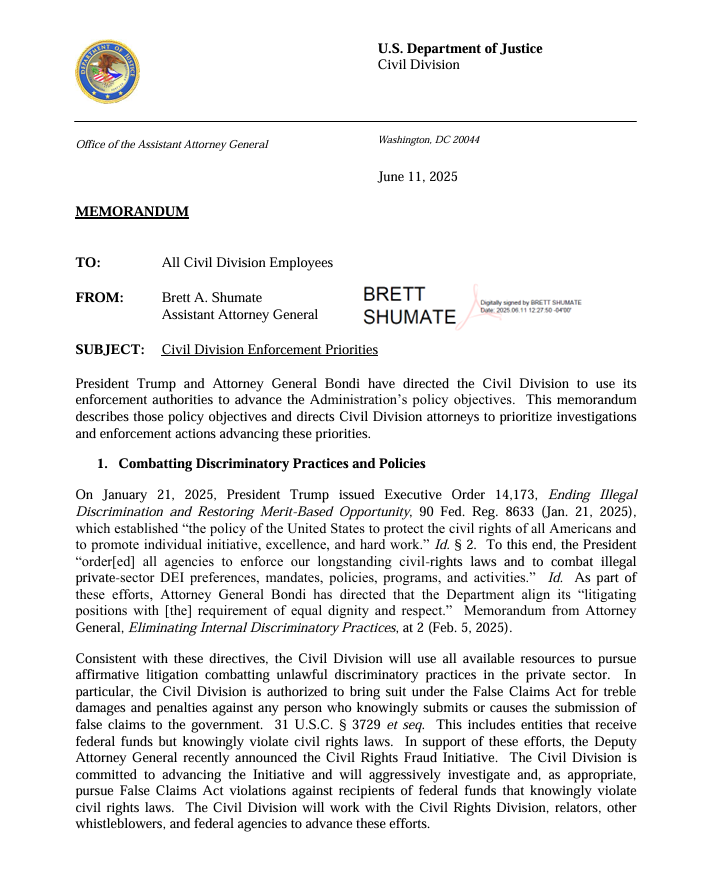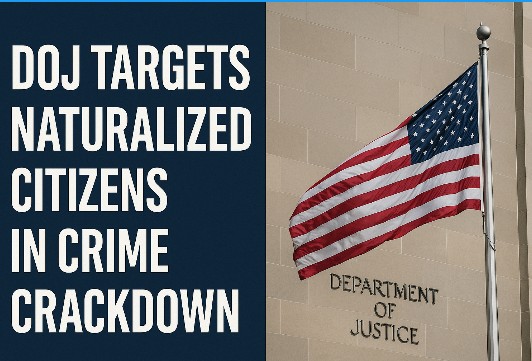DOJ Orders Attorneys To Pursue Citizenship Revocation For Naturalized Americans Linked To Crime
In a sweeping directive issued within the past 60 days, the Department of Justice has instructed U.S. attorneys nationwide to actively seek revocation of U.S. citizenship from naturalized immigrants who are found to have committed serious crimes or obtained their citizenship through fraudulent means. The new guidelines were disclosed in an internal memo obtained by Fox News and Off the Press, confirming the Biden administration’s renewed emphasis on enforcing denaturalization for individuals with criminal ties.
The memo from Assistant Attorney General Brett Shumate directs prosecutors to prioritize cases where individuals have engaged in conduct that “implicates national security, public safety, sex offenses, human trafficking, or significant fraud.” While the DOJ frames the move as a return to lawful enforcement, many conservatives have noted the irony of such a policy under an administration that has otherwise weakened immigration enforcement and de-prioritized border security.

“The benefits of civil denaturalization include the government’s ability to revoke the citizenship of individuals who engaged in the commission of war crimes, extrajudicial killings, or other serious human rights abuses; to remove naturalized criminals, gang members, or, indeed, any individuals convicted of crimes who pose an ongoing threat to the United States; and to prevent convicted terrorists from returning to U.S. soil or traveling internationally on a U.S. passport,” Shumate wrote.
The DOJ claims the new push is not about immigration status per se, but about safeguarding the integrity of the naturalization process. “Our goal is to preserve the rule of law,” the memo states. “When individuals lie or commit crimes before, during, or after naturalization, it undermines the public’s trust in our system.” The legal basis for such actions lies in Title 8 of the U.S. Code, which allows for revocation of citizenship obtained through willful misrepresentation or concealment of material facts.
Historically, denaturalization has been a rare and serious action, reserved for cases involving terrorism, espionage, or participation in war crimes. Under President Biden, the DOJ reinvigorated its efforts through the creation of a specialized Denaturalization Section, launched in 2020. That section pursued individuals who falsified immigration documents or concealed serious crimes like sexual abuse, human trafficking, and membership in extremist organizations. After President Trump took office, the unit was dissolved—but this new guidance appears to revive elements of that effort, albeit under a different label.
Critics on the Left have already voiced opposition to the renewed denaturalization efforts, claiming they could be used to target marginalized communities or discourage immigration. However, legal experts note that the initiative applies only to individuals who have committed crimes or engaged in deceit, and not to law-abiding immigrants. Conservative leaders and Christian commentators argue that maintaining accountability is not only legal but also moral.
“Scripture tells us that rulers are God’s servants to bring punishment on the wrongdoer,” said Pastor Michael R., a contributor to Faith & Freedom Today. “Revoking citizenship from those who defraud the system or harm others is a form of justice—not oppression. Christians should support efforts to uphold righteousness in the nation’s gates.”
The DOJ memo outlines multiple paths to denaturalization, including both criminal and civil litigation. Prosecutors are encouraged to use criminal charges such as false statements or fraud where appropriate, and civil proceedings under 8 U.S.C. § 1451(a) when necessary. The civil route, while less severe than criminal prosecution, can still result in complete revocation of citizenship and potential removal from the U.S.
Immigration attorneys, meanwhile, have noted a spike in anxiety among naturalized citizens, particularly those whose backgrounds might be scrutinized under the new guidance. “There’s going to be a ripple effect,” said Charles Kuck, an Atlanta-based immigration lawyer. “Even naturalized individuals with minor discrepancies in their paperwork are going to worry. But this is what happens when the government sends mixed signals—open borders on one side, aggressive enforcement on the other.”
Conservatives argue this discrepancy highlights the hypocrisy of the Biden administration’s approach to immigration. While millions of migrants have entered the country under chaotic and lenient border policies, the DOJ now appears eager to pursue select naturalized citizens years after they completed their legal journey to citizenship.
Some legal analysts warn this could become another tool for selective enforcement. Given the politicization of the DOJ in recent years, the possibility remains that this policy could be used to punish political opponents or curry favor with specific voter bases. Others believe it could simply serve as a distraction from the administration’s failures in other areas of immigration policy.
Still, the concept of revoking fraudulently obtained citizenship is supported by a broad majority of Americans. A 2024 Pew Research poll showed that 78% of U.S. adults believe immigrants who commit serious crimes or lie during the naturalization process should lose their citizenship and be deported.
The memo has already triggered internal discussions across multiple federal offices, and the first round of targeted denaturalization cases is expected to be filed in coming weeks. While the long-term impact remains to be seen, one thing is clear: the DOJ has decided to take a firmer stance—at least on paper—on those who violated the trust embedded in the oath of American citizenship.
As America continues to wrestle with the balance between compassion and accountability, many Christian conservatives view this directive as a small but meaningful affirmation of justice. After years of lawlessness at the borders and in the streets, holding individuals accountable for criminal deception during the citizenship process is seen as not only constitutional but deeply moral.





